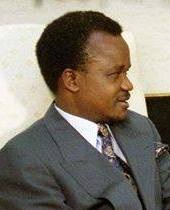 |
|---|
Milanzi is a constituency of the National Assembly of Zambia. [1] It covers Chilembwe in Katete District of Eastern Province.
 |
|---|
Milanzi is a constituency of the National Assembly of Zambia. [1] It covers Chilembwe in Katete District of Eastern Province.

Elections in Zambia take place within the framework of a multi-party democracy and a presidential system. The President and National Assembly are simultaneously elected for five-year terms.

The National Assembly is Zambia's unicameral legislative body. Between 1972 and 1990, Zambia was a one-party state with the United National Independence Party (UNIP) as the sole legal party.

The Speaker of the National Assembly of Zambia is a position established under Article 69(1) of the constitution. The Speaker is elected by members of the Assembly from anyone eligible to be elected to the National Assembly, but cannot be a sitting member.

Katete District with headquarters at Katete in Eastern Province, Zambia, includes woodland in the north sloping down into the Luangwa Valley, good farmland amid rocky hills in the centre, and deforested plateau exposed to soil erosion and degradation in the south along the border with Mozambique. As of the 2000 Zambian Census, the district had a population of 189,250 people. It consists of two constituencies, namely Mkaika and Milanzi.

General elections were held in Zambia on 19 December 1968 to elect the National Assembly and President. The first post-independence polls saw incumbent Kenneth Kaunda retain his post as president, whilst his United National Independence Party, the only party to field candidates in all 105 constituencies, won 81 of the 105 seats in the National Assembly. Voter turnout was 82.5% in the parliamentary election, but 87.1% in the presidential election.

General elections were held in Zambia on 5 December 1973. They were the first elections held since the country was formally declared a one-party state in August, with the United National Independence Party (UNIP) as the only legally permitted party. UNIP leader Kenneth Kaunda was automatically elected to a third five-year term as President, and was confirmed in office via a referendum in which 88.8% of voters approved his candidacy. UNIP also won all 125 seats in the National Assembly. Voter turnout was 39% of the 1,746,107 registered voters for the presidential election, and 33% for the National Assembly election.

General elections were held in Zambia on 31 October 1991 to elect a President and National Assembly. They were the first multi-party elections since 1968, and only the second multi-party elections since independence in 1964. The United National Independence Party (UNIP), which had led the country since independence, was comprehensively beaten by the Movement for Multi-Party Democracy (MMD). Kenneth Kaunda, who had been president since independence, was defeated in a landslide by MMD challenger Frederick Chiluba in the presidential elections, whilst the MMD won 125 of the 150 elected seats in the expanded National Assembly. Voter turnout was 45%.
Fipa is a Bantu language of Tanzania. It is spoken by the Fipa people, who live on the Ufipa plateau in the Rukwa Region of South West Tanzania between Lake Tanganyika and Lake Rukwa. The ethnic group of the Fipa people is larger than the group of Fipa language speakers. On the Tanzanian side, people who speak Mambwe-Lungu may identify as Fipa and consider their language to be a dialect of Fipa. Lungu and Mambwe are also spoken in Zambia where they are considered languages and their speakers are considered to be ethnic groups in their own right, although linguists consider Lungu and Mambwe to be dialects of a single language. There are three dialects: Milanzi, Kwa (Ichikwa) and Nkansi.
Luke Bruno Milanzi, variously known as Luka Milanzi or Bruno Milanzi, is a former Malawian footballer.

Mkaika is a constituency of the National Assembly of Zambia. It covers Katete and Mpoto in Katete District of Eastern Province.

Nalolo is a constituency of the National Assembly of Zambia. It covers Nalolo District in Western Province.

Mulobezi is a constituency of the National Assembly of Zambia. It covers Mulobezi and surrounding areas in Mulobezi District of Western Province.

Mongu Central is a constituency of the National Assembly of Zambia. It covers part of Mongu District in Western Province.

Sesheke is a constituency of the National Assembly of Zambia. It covers Sesheke and surrounding towns in Sesheke District of Western Province.

Nalikwanda is a constituency of the National Assembly of Zambia. It covers part of Mongu District in Western Province.

Chikankata is a constituency of the National Assembly of Zambia. It covers Chikankata District in Southern Province.

Gwembe is a constituency of the National Assembly of Zambia. It covers Gwembe and Munyumbwe in Gwembe District of Southern Province.

Magoye is a constituency of the National Assembly of Zambia. It covers the village of Magoye and surrounding areas in Mazabuka District of Southern Province.

Mangango is a constituency of the National Assembly of Zambia. It covers part of Kaoma District in Western Province.

Luena is a constituency of the National Assembly of Zambia. It covers Limulunga District in Western Province, including the town of Limulunga.